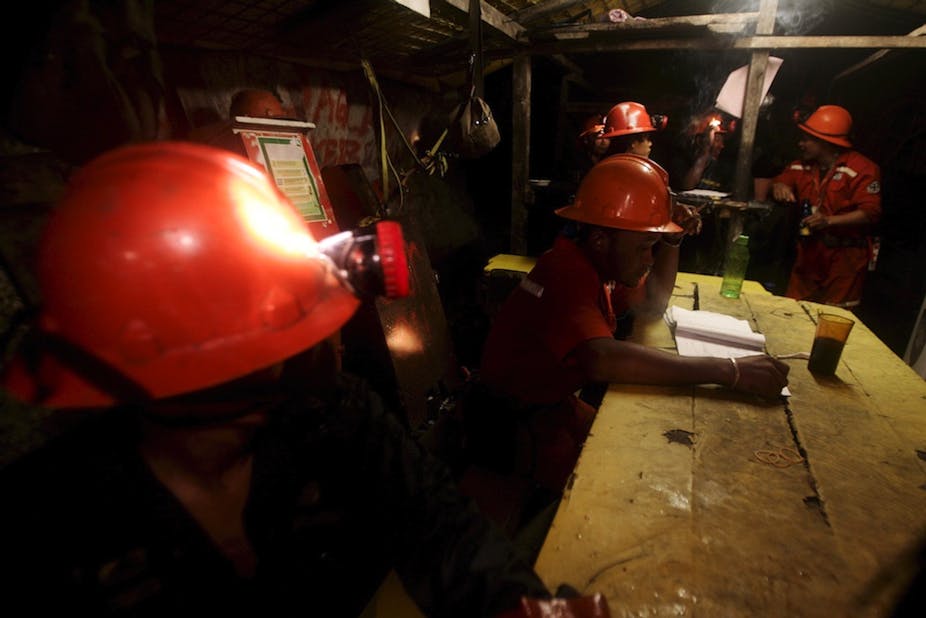The recent announcement that foreign mining companies in Indonesia would have to sell at least 49% of their shares to local interests raises questions about whether this indicates a change of direction for economic policy in Indonesia. And, if so what the impact might be on the economy and foreign investors.
As Hal Hill from ANU observed recently, there is something of a tradition in Indonesia that when the economy is doing well – as Indonesia’s is right now – governments adopt more protectionist economic policies. This is undoubtedly the case here.
In recent weeks alone, the government has announced a series of measures that would limit foreign economic activities in the country and support local industry.
Foreigners, for instance, are slated to be banned from holding positions of authority in human resource management divisions of companies, on the grounds that they do not understand cultural issues associated with managing an Indonesian workforce.
Regulations have been announced or issued limiting the export of unprocessed minerals, in order to support local processors.
There is discussion about limiting the percentage of shares foreigners can hold in Indonesian banks, which currently stands at 99%.
These changes have not been unopposed. Indeed, they have already claimed political scalps. Last year, two key economics ministers – Sri Mulyani, the Finance Minister and Mari Pangestu, Minister for Trade – lost their jobs. Pangestu in particular had been associated with free trade, and had carriage of the China-ASEAN free-trade agreement, which entered force fully for Indonesia on 1 January, 2010.
But, as some in Australia have suggested, is this simply Indonesian economic nationalism raising “its ugly head”?
Defenders of the policy initiatives would say there is nothing “ugly” about looking after local interests before foreign ones, or about ensuring that the state gets a reasonable share of the return from foreign investment, including in mining.
More broadly, liberalism – in the economic sense – has long been a dirty word in many quarters in Indonesia, as it is suggestive of foreign economic exploitation.
For all that foreign capital may contribute to the nation’s economy, it occupies an uneasy position politically. And foreign investment is an all too easy target of popular opposition. Almost any demonstrations against government economic policy – such as the current ones protesting a possible price hike for fuel – will include criticism of the alleged role of foreign capital in the issue in dispute.
If the result of these changes in policy was to reduce the level of foreign investment, this would be an acceptable price to pay for greater local control of the economy for some activists, including some in or close to the government.
But the cost to the economy, and thus to the community, would be substantial. Indonesia is in dire need of investment, particularly investment in economic infrastructure. The dire state of such infrastructure constitutes probably the second biggest barrier to the further development of the economy, after corruption.
If foreign investment funds were withdrawn, and local funds were spent on acquiring shares in existing companies, rather than being invested in new ventures, this would hardly be in the Indonesian national economic interest.
But will these changes actually have a significant impact on foreign investment in the Indonesian economy, particularly in the mining sector?
The assertion that “the devil is in the detail” is no cliche in Indonesia: it is an ever-present fact of life. These regulations are no exception.Exactly how they will be implemented is yet to be explained.
Coordinating Minister for Economic Affairs, Hatta Rajasa, was undoubtedly right when he asserted that while foreign investors would be prepared to accept the changes, what they would not accept would be a divestment process that was not transparent and accountable.
The mining industry faces significant challenges in Indonesia. The decentralisation of economic and political decision-making has greatly empowered the provinces and the districts in the management of mining activities. This has led to an increased burden of taxation on those companies and greater demands for responsible management of the local environment.
Some mining companies will undoubtedly find these new regulations – assuming they are implemented – to be the last regulatory straw.
But for many such companies, the question will be: if not Indonesia, then where? Given the current state of the world economy, Indonesia still looks pretty attractive as an investment destination.

